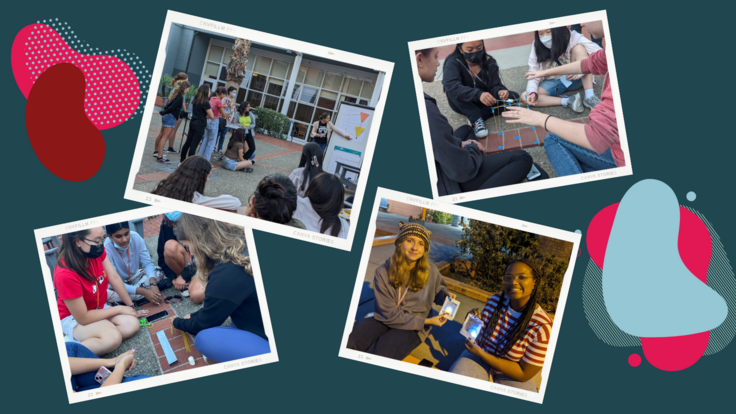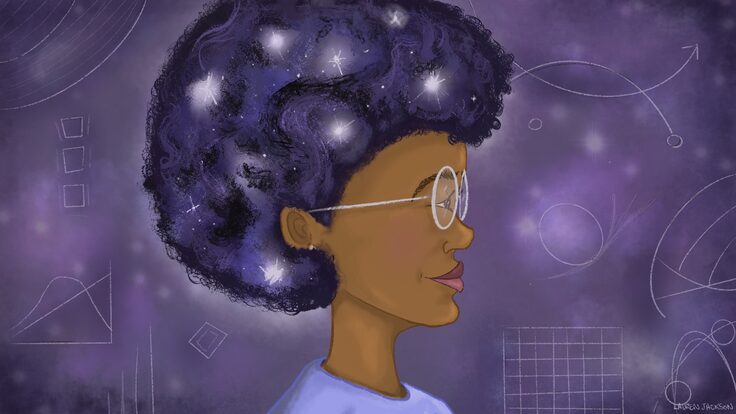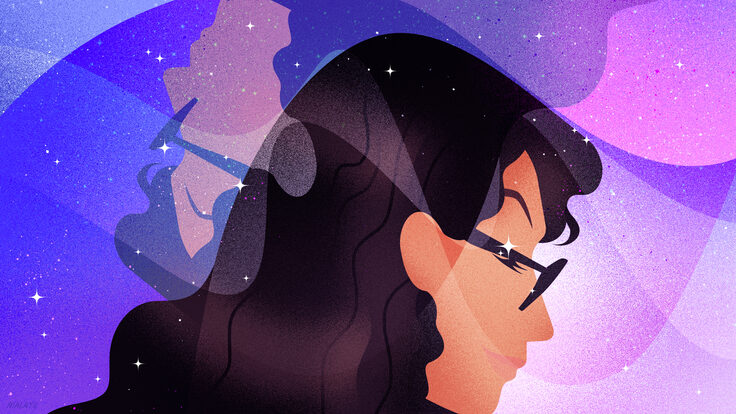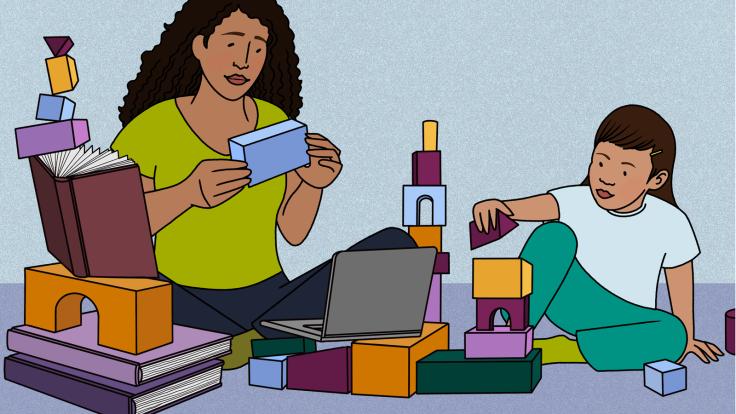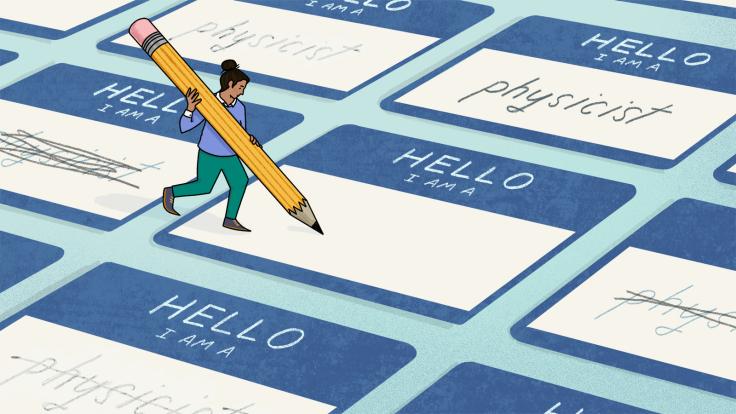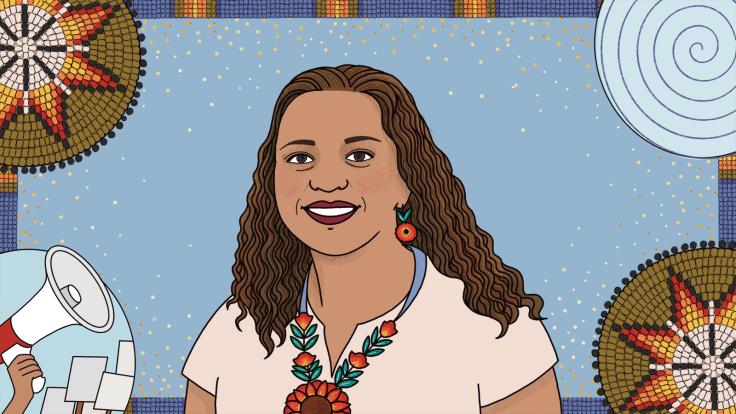Recognized as gifted but frustrated by a hearing condition she did not yet understand, Renée Horton dropped out of college at age 18. When she returned a decade later, she was raising three kids on her own.
A chance encounter with the National Society of Black Physicists gave Horton a new vision for her future. She went on to become the first African American to earn her PhD in material science—with a focus in physics—at the University of Alabama. Then she landed a job at NASA.
About two years ago, members of NSBP approached Horton to help them reinvigorate the organization that had provided her guiding star. Now, at the end of her two-year term as NSPB president, she discusses her experiences with Symmetry.
How did you get interested in science?
I was always very aware of the stars and the sky, and was always interested in science, even in elementary school.
But it wasn’t until I got to middle school and my science teacher—my 8th grade science teacher, Mr. Merrill, was very different. He was, like, a 6-foot-6 biker dude who actually came to school in black riding boots. He rode a Harley. And he had a leather jacket. And he had a beard like ZZ Top.
What that said to me right then was, even though I really didn’t know any Blacks in science, you really didn’t have to look like the typical Einstein to be a scientist. He was an amazing science teacher, and I think, for me, that’s when my love really kicked off.
I was in awe of the stars when I got my first telescope—you know, just being able to look beyond Earth. And then he just kind of sealed the deal for me, I guess.
When did you get your first telescope?
I got my first telescope on Christmas, and I had to be maybe 8 or 9. We [my brother and I] used to scale the antenna on the side of the house and put the telescope on top of the roof. And then we’d sit on the roof and look up at the stars and pray that when we got down we didn’t break anything.
I guess you didn’t break anything?
Um, actually, I broke my arm once. We didn’t tell my parents we were on the roof, per se. But I think they may have known. It still didn’t stop me from scaling the antenna.
How did you wind up in physics?
I’m a nontraditional student. So I started school the first time, didn’t get through, got pregnant, got married, followed my husband’s career, and then went back to school as a single parent. And then I actually went into engineering.
I got sent to a physics conference as a chaperone. It was the National Association of Black Physicists conference in 2003, and I was blown away. I was blown away at the research that the other students were doing. I was blown away that I was standing in a room of extremely smart Black people talking about things that were so beyond, you know, the universe, and I wanted that.
Was that your first science conference?
It wasn’t my first science conference. I had gone to NSBE, the National Society of Black Engineers, and I had gone to IEEE [the Institute of Electrical and Electronics Engineers].
But I never felt quite like engineering was it for me, because even when I was going to undergrad, the professor was like, “You need to go to grad school,” because I kept asking, “Well, why? Why are we doing this like this? And why are we doing this? And what happens if you do this differently?”
And the professor was like, “Yeah, you need to go to grad school. That’s where they answer those questions at. We don’t answer those questions here.”
And it was while I was in grad school for engineering that one of the professors—I wasn’t doing so well in his class, and he said, “You’re probably one of the dumbest students I’ve ever met. Are you sure you want to be doing a graduate degree?”
I was having a lot of difficulty understanding him because I’m hearing-impaired, and he spoke English as a second language. And I wasn’t understanding a lot of the words that he was saying. And even though I had a note-taker, the note-taker was also having trouble understanding him. So I never really could get complete notes to be able to truly understand what he was teaching, and I just didn’t fare well at all in his class.
But I was pretty certain I wasn’t dumb—because I could do physics, right? [She had taken a couple of lower-level classes.] And so I was like, I’m almost certain I’m not dumb. This just isn’t for me. Or this teacher just isn’t for me.
It was all that year that I was introduced to physics and was just in awe and gravitated toward it and wound up switching universities, switching concentrations from engineering to physics. I was just blown away with quantum. And math, I love math, and so when I got to do the math physics course, I was just like, yes, this is where I belong.
Were other people telling you that you didn’t belong?
I had a professor actually tell me that women should be at home raising the children. They shouldn’t be trying to get advanced degrees.
I was a single parent, too, so I was like, oh well, we rollin’ together, me and the kids. I’m going to get this degree one way or the other.
The sad part about it is, even being a nontraditional student and graduating now almost seven years ago, I’m still running into students that are feeling like they’re being second-guessed.
So that’s what I’m constantly talking about when I’m traveling now. What I’m constantly telling these students when I’m talking to them now is that you do belong here. You really have earned your seat at the table. Don’t let other people tell you you haven’t, because you have. You have a right to be here.
How did your hearing loss affect your studies?
When I went back to school the second time, I was more accepting of my hearing loss than I was before. I went back and it was like, you know what? This is who I am, and I’m going to accept it, and I’m going to learn to deal with it.
I did the nerdy thing, too. I started studying my hearing loss. I started trying to figure out what my hearing loss was, what was the best way for me to learn, what accommodations I needed.
And I was also more accepting of accommodations. Before I felt like accommodations were a show of weakness. When I went back to school it was like, yo, I want these accommodations—because I want to be amazing. I want to apply all my brainpower.
I had a note-taker. Him and I ended up being best friends. Because we had to take classes together. So after that first semester, all of our classes were together. He was an electrical engineering major as well—with a minor in math. I convinced him he needed to do a minor in math because I needed the note-taker. And then he went back and got a Latin degree. And we’re best friends still to this day.
I did all the coursework, but I did not pass the qualifier for the master’s program to get my thesis. I ended up leaving and enrolling in the PhD program. A professor actually recruited me and was like, “You don’t have to have a master’s.” I was like, “What? Yes, you do.” And he was like, “No, I don’t have a master’s. You don’t have to have a master’s. Nobody really cares if you have a master’s.”
And then I changed schools and went to University of Alabama and enrolled in the materials science program with a physics concentration. So all of my degrees actually came in my second time around, as a mom with three kids.
It’s a very interesting dynamic to have kids when you’re in school. The two were older, and when I went back to undergrad, my daughter was 2 at the time. So it was just a lot of preparation, a lot of planning that we had to do. We had a calendar on the wall, and if whatever the activity was didn’t make the calendar by Sunday, we didn’t do it. And I was very strict with that and held to that.
What do you do now?
I’m a materials physicist, so I am currently overseeing the metals and the welds on our space launch system, which is the new rocket that NASA is building that’ll eventually take us to Mars.
It’s an amazing thing to me because I look at parts and pieces sometimes and then I watch these guys integrate it together and, sooner or later, this year or the beginning of next year, we’ll have a whole rocket based off of the parts and pieces that I actually saw.
Mars is set for 2030, but we have some other missions that are coming before that. We have a mission in 2019 and then another one in 2020 or 2021. This is a new rocket system, so we really have to test it out way before we ever put humans on it.
When did you join the National Society for Black Physicists?
I didn’t join until 2004. In 2005 I represented the National Society for Black Physicists at the IUPAP [International Union of Pure and Applied Physics] Women’s Conference in Brazil, and everything just kind of took off from there.
I came back and created a women’s group for NSBP. I stayed a part of the organization up until about 2010, when I had a disagreement with one of the physicists [in leadership] and dropped out. I didn’t have anything else to do with the organization until they called and said, “We need you to run for president.”
Why did they need you to run for president?
They knew my work ethic and my attitude. I had worked with the organization before and had done some great things with the women’s group.
I’m very proud to say that we were able to help with restructuring debt that the organization had. We were able to rebuild membership with the organization, as well as reigniting that interest in the organization and getting more people to actually work with us and contribute financially.
How big is the organization?
The organization is about 385 members, with about 80 percent being students.
There are some unique benefits that come with being a member of NSBP. A lot of times we get organizations that are particularly looking to diversify their workforce, or have special programs for diverse students, and so they come to our organization.
Being a member also gives you direct access to mentors that have been through what you’re going through. It gives you access to the famous African American physicists—because most of them show up at the conference.
Our membership is not just African Americans, it’s anybody that wants to support African Americans as well.
What have your goals been during your time as president?
I always felt that there were so many people and so many programs trying to help African American physicists or Black physicists, but none of them were asking us how we needed to be helped. They were kind of deciding, you know, “We should do this program,” and then we were getting invited afterwards.
And one of the things we went into our tenure saying was that if you weren’t inviting us to the table when the planning was happening, we weren’t interested in being at the table.
What is something that people were missing?
One of the things is that they want to think that it’s enough to give a student a mentor, and they were neglecting how important it is for a student to see, know and interact with people who look like them. That’s really important. There’s a whole lot of research on that.
At NSBP we give you that. You can walk in a room and you can find somebody who looks like you, whether you’re male or female, but you can also find somebody who is as nerdy as you, you can find somebody who is as eclectic as you, you can find somebody who’s as straight and narrow as you. You really can.
To be in a place where you can find somebody that you can find a connection with, that’s what you need sometimes. We would always say that the conference was the way that we refilled our cup, to be able to endure what it was like being the only—or being the first—or being one of two.
You know, a lot of us are walking around with that feeling that, if I mess up, I’m going to close a door for the next Black that’s coming behind me. So that’s quite a big burden. But when they’re with us at the conference or with us in our environment, they don’t have to feel like that. So it’s a relief for them, even if it’s just a weekend. But it’s also just a way to refill that cup for them to keep going.





